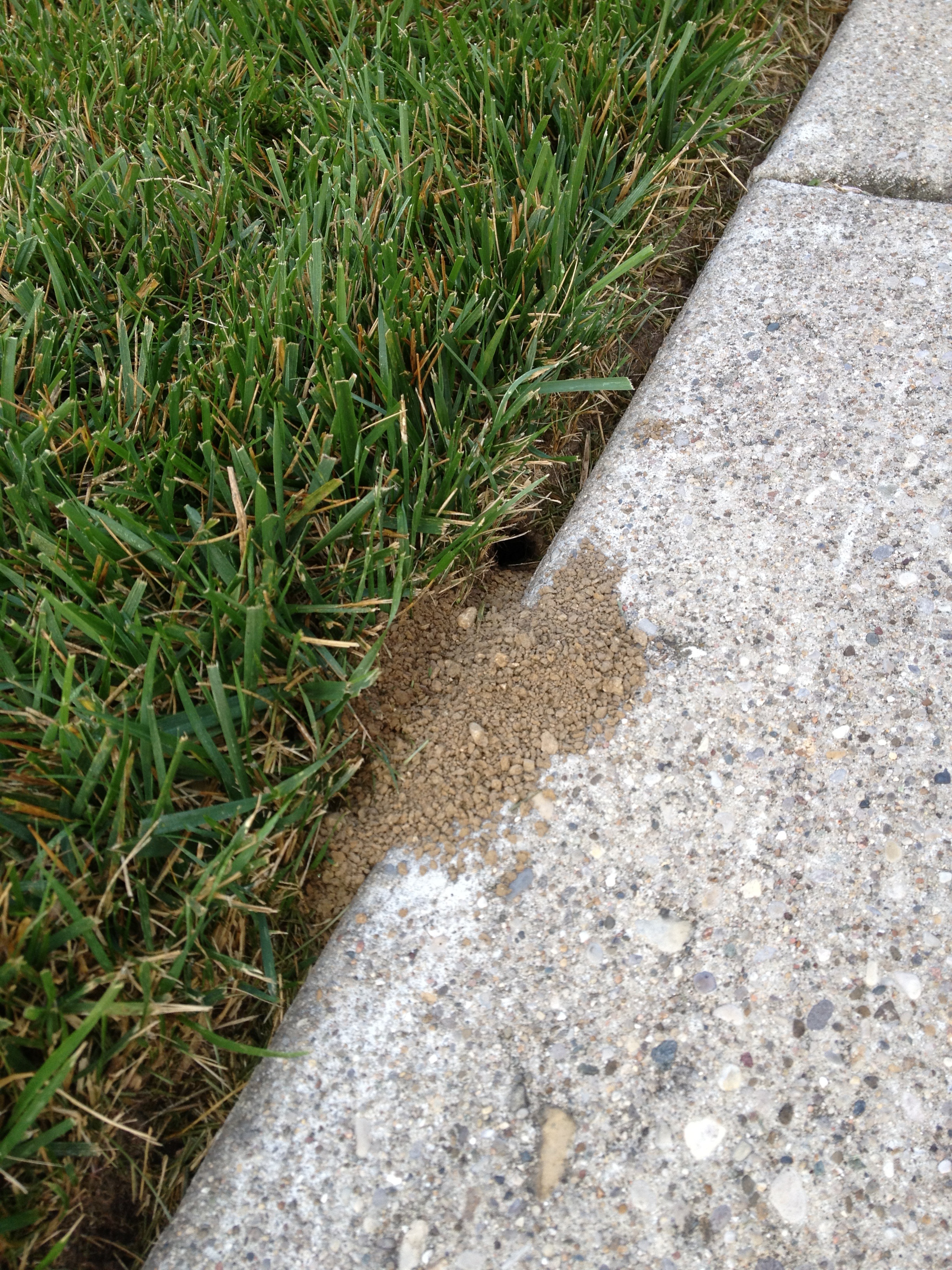 Purdue University - Extension - Forestry and Natural Resources
Purdue University - Extension - Forestry and Natural Resources
Got Nature? Blog
Determining what causes holes in lawn and landscaping can be a challenging endeavor for any homeowner. The size of the hole, the presence of excavated dirt and the timing of activity are all good clues to consider. Recently, I had several holes along my driveway and sidewalk that perplexed me. I’m no stranger to holes in my yard. I’ve been combating moles in my yard (we will save that for another post) and had recently observed dead mice and shrews in my driveway. I also have many chipmunks and gray squirrels around the yard. All of these can make holes of one type or another. However, these new holes looked different. They were clearly a tunnel/burrow with an entrance of 1.5 inches. Squirrels dig holes to bury/dig nuts or to feed on small plants. Chipmunks make 1.5 inch holes, but they carry the cast soil away in their mouths which results in a less conspicuous hole. Shrews and voles will excavate holes and tunnels, but these looked different. Voles usually are found in areas with overhead cover such as densely planted landscaping beds, areas with ground ivy or similar plants and beds with think mulch. These holes were exposed far from cover. So what were they?
All of these can make holes of one type or another. However, these new holes looked different. They were clearly a tunnel/burrow with an entrance of 1.5 inches. Squirrels dig holes to bury/dig nuts or to feed on small plants. Chipmunks make 1.5 inch holes, but they carry the cast soil away in their mouths which results in a less conspicuous hole. Shrews and voles will excavate holes and tunnels, but these looked different. Voles usually are found in areas with overhead cover such as densely planted landscaping beds, areas with ground ivy or similar plants and beds with think mulch. These holes were exposed far from cover. So what were they?
It just so happens I was at a colleague’s house recently, and he mentioned all the cicada killers he has around the house. He literally had dozens of holes in areas with exposed soil just like the ones I observed at home. To my delight, I finally had the answer to my question.
Cicada killers are large wasps but unlikely to sting. Purdue’s Department of Entomology has more on cicada killers free downloadable pdf, Household and Structural, Cicada Killers.
Brian MacGowan, Wildlife Extension Specialist
Department of Forestry and Natural Resources
Purdue University

Recent Posts
- Experience Indiana’s Sandhill Crane Fall Migration
Posted: November 8, 2024 in Forestry, Wildlife - Purdue Extension’s Showcase, Impacting Indiana
Posted: in Community Development, Forestry, Forests and Street Trees, Gardening, Land Use, Natural Resource Planning, Timber Marketing, Urban Forestry, Wildlife, Wood Products/Manufacturing, Woodlands - Deer Season is Here, MyDNR and Wild Bulletin
Posted: in Forestry, Wildlife, Woodlands - ID That Tree: Learn to Identify Hoptree/Wafer Ash
Posted: October 30, 2024 in Forestry, Forests and Street Trees, How To, Urban Forestry, Wildlife - Publication – Handbook on Processing Fish for Small-Scale Fish Farmers
Posted: October 17, 2024 in Aquaculture/Fish, Aquatic/Aquaculture Resources, How To, Publication, Wildlife - When Roundup Isn’t Roundup – Purdue Landscape Report
Posted: in Forestry, Gardening, Plants, Urban Forestry - American Citizen Planner – Indiana Program Celebrating 4 Years of Impact
Posted: October 16, 2024 in Community Development, Land Use - IN DNR Deer Updates – Epizootic Hemorrhagic Disease Detected in Several Areas in Indiana
Posted: in Alert, Disease, Forestry, How To, Wildlife, Woodlands - Black Spot of Elm – Purdue Landscape Report
Posted: October 15, 2024 in Urban Forestry, Wildlife, Woodlands - Economics and Aquaculture Expert Kwamena Quagrainie is Featured Specialist in ANR Newsletter
Posted: in Aquatic/Aquaculture Resources, Great Lakes
Archives
Categories
- Alert
- Aquaculture/Fish
- Aquatic/Aquaculture Resources
- Ask the Expert
- Christmas Trees
- Community Development
- Disease
- Drought
- Forestry
- Forests and Street Trees
- Gardening
- Got Nature for Kids
- Great Lakes
- How To
- Invasive Animal Species
- Invasive Insects
- Invasive Plant Species
- Land Use
- Natural Resource Planning
- Nature of Teaching
- Plants
- Podcasts
- Ponds
- Publication
- Safety
- Spiders
- Timber Marketing
- Uncategorized
- Urban Forestry
- Webinar
- Wildlife
- Wood Products/Manufacturing
- Woodland Management Moment
- Woodlands